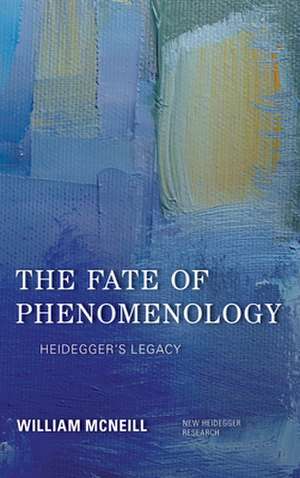FATE OF PHENOMENOLOGY HEIDEGGPB: New Heidegger Research
Autor William McNeillen Paperback – 16 iul 2020
Din seria New Heidegger Research
-
 Preț: 352.81 lei
Preț: 352.81 lei -
 Preț: 253.65 lei
Preț: 253.65 lei -
 Preț: 299.46 lei
Preț: 299.46 lei -
 Preț: 333.87 lei
Preț: 333.87 lei -
 Preț: 439.64 lei
Preț: 439.64 lei - 27%
 Preț: 877.52 lei
Preț: 877.52 lei -
 Preț: 394.59 lei
Preț: 394.59 lei -
 Preț: 313.47 lei
Preț: 313.47 lei - 27%
 Preț: 896.60 lei
Preț: 896.60 lei -
 Preț: 436.76 lei
Preț: 436.76 lei -
 Preț: 330.18 lei
Preț: 330.18 lei - 27%
 Preț: 770.86 lei
Preț: 770.86 lei -
 Preț: 462.76 lei
Preț: 462.76 lei -
 Preț: 455.85 lei
Preț: 455.85 lei -
 Preț: 391.20 lei
Preț: 391.20 lei -
 Preț: 330.42 lei
Preț: 330.42 lei -
 Preț: 395.99 lei
Preț: 395.99 lei -
 Preț: 350.63 lei
Preț: 350.63 lei -
 Preț: 429.04 lei
Preț: 429.04 lei - 27%
 Preț: 712.70 lei
Preț: 712.70 lei - 23%
 Preț: 705.83 lei
Preț: 705.83 lei - 27%
 Preț: 846.71 lei
Preț: 846.71 lei -
 Preț: 439.64 lei
Preț: 439.64 lei - 27%
 Preț: 875.29 lei
Preț: 875.29 lei -
 Preț: 459.86 lei
Preț: 459.86 lei -
 Preț: 437.51 lei
Preț: 437.51 lei -
 Preț: 405.25 lei
Preț: 405.25 lei - 27%
 Preț: 817.30 lei
Preț: 817.30 lei -
 Preț: 400.03 lei
Preț: 400.03 lei -
 Preț: 330.05 lei
Preț: 330.05 lei - 23%
 Preț: 707.47 lei
Preț: 707.47 lei -
 Preț: 321.86 lei
Preț: 321.86 lei - 27%
 Preț: 771.67 lei
Preț: 771.67 lei -
 Preț: 277.69 lei
Preț: 277.69 lei -
 Preț: 421.37 lei
Preț: 421.37 lei - 27%
 Preț: 886.06 lei
Preț: 886.06 lei
Preț: 370.98 lei
Nou
Puncte Express: 556
Preț estimativ în valută:
71.01€ • 73.17$ • 59.95£
71.01€ • 73.17$ • 59.95£
Carte tipărită la comandă
Livrare economică 03-17 martie
Preluare comenzi: 021 569.72.76
Specificații
ISBN-13: 9781786608918
ISBN-10: 178660891X
Pagini: 170
Dimensiuni: 152 x 229 x 13 mm
Greutate: 0.27 kg
Editura: Rowman & Littlefield
Seria New Heidegger Research
ISBN-10: 178660891X
Pagini: 170
Dimensiuni: 152 x 229 x 13 mm
Greutate: 0.27 kg
Editura: Rowman & Littlefield
Seria New Heidegger Research
Cuprins
Introduction / 1. From Phenomenology to Letting Be / 2. A Question of Method? The Crisis of Phenomenology and `The Origin of the Work of Art¿ / 3. The Phenomenology of Being and the Matter of Concealment / 4. Phenomenophasis: The Last Word of Phenomenology? / Conclusion / Bibliography / Index
Descriere
In this important new book, leading Heidegger scholar William NcNeill provides a concise and systematic appraisal of the fate of phenomenology in Heidegger. He shows how the issue of "letting be" is already central and prominent in Heidegger's early phenomenology and examines Heidegger's phenomenological approach in relation to art and poetry.
